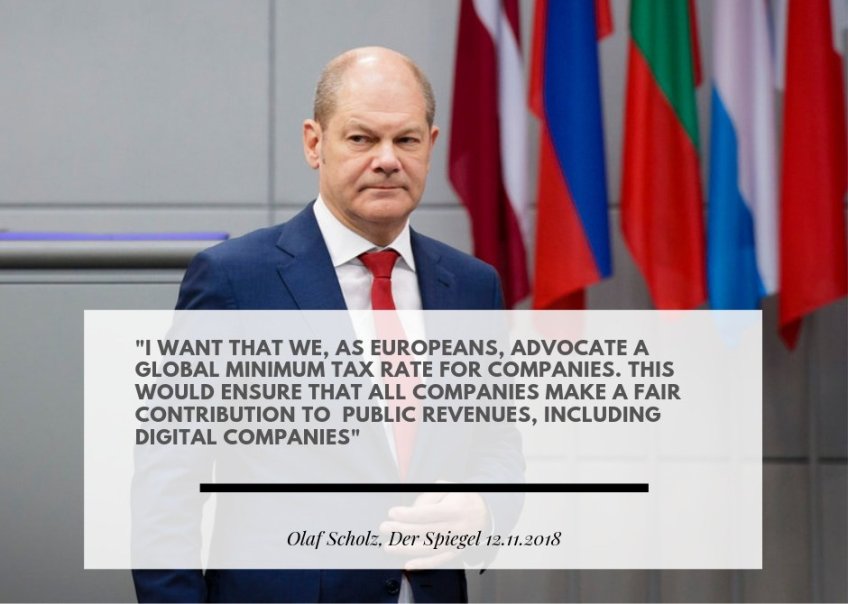We are facing a significant problem of social justice, as these companies do not contribute their fair share to the revenues of the countries where they make their profits. This is unfair not only towards citizens, but also towards traditional and smaller companies, who do not have the means to avoid taxes. The European Commission estimated that digital companies are taxed at an effective tax rate of 9.5% on average, compared to 23.2% for traditional companies in the EU. Many calls for a reform of the tax system have already been heard and proposals are on the table. But negotiations on an international solution seem to be stalling: what are we waiting for?
The Franco-German promise
Well, here is someone, at least, who couldn’t wait:

Despite ongoing negotiations on an EU-wide digital tax, the French government has decided to unilaterally introduce a tax on the revenue of digital companies in France. The new tax, which enters into force in January 2019, will target revenue from online advertising and sales of user data with an expected annual revenue of 500 million euros. No doubt, the French government reacted to pressure from the yellow jackets to show that it could also be tough on business and take measures for more social justice. But stalling negotiations at EU level may also have prompted this decision.
Too bad for Olaf Scholz, German Finance Minister, who was praised less than a month earlier for an alleged breakthrough with his French colleague on a common EU approach:
Wer Brötchen verkauft, zahlt Steuern. Wer als Internetgigant Online-Werbung anbietet oder wer mit Börsengeschäften Umsatz macht, hingegen nicht. Das darf nicht sein! Der neue Vorstoß von @OlafScholz und seinem französischen Kollegen kann endlich für Gerechtigkeit sorgen. Gut so!
— Andrea Nahles (@AndreaNahlesSPD) 4. joulukuuta 2018
The Digital Tax has been high on the political agenda of both countries lately. In the Meseberg declaration, which resulted from the Franco-German summit in June 2018, they pledged “to reach an EU agreement on a fair digital taxation by the end of 2018”. Shortly after his election in May 2017, the tax was already on the agenda of the French president. In Germany, the coalition government pledged support for a “fair taxation of big companies, in particular of digital companies such as Google, Apple, Facebook and Amazon”. Angela Merkel even recognised the need to tax digital companies and called this “a central issue of justice for the future”.
In November 2018, however, the German Finance Minister showed first signs of backing away from the initial idea of introducing a new system of taxation tailored to the specificity of the digital economy. In an opinion article in Die Welt, he instead proposed a minimum taxation rate which would ensure that digital companies would also pay their fair share of taxes. This proposal makes sense if you consider the main problem of taxation in the digital economy to be the fact that digital companies are no longer bound by a certain place of production and hence can move their company sites to low-tax jurisdictions. By introducing a minimum corporate tax rate, you would decrease the incentives for companies to move away from the place where they make their profits. As I will explain below, however, I am not convinced that this addresses the underlying issue.
In the end, the Franco-German tandem agreed on a proposal that would foresee an EU-wide tax on online advertising with a tax rate of 3% on generated revenues. This tax would come into force only by 2021, unless “an international solution has been agreed on”, referring to ongoing discussion at OECD level (while it is unclear whether this concerns a digital tax or minimum taxation). In other words: let’s postpone the decision for 2-3 years and maybe we can still avoid it by then.
What is behind the EU proposal?
The proposal by the Franco-German partners is weaker than the proposal that the European Commission had already brought forward in March 2018. The latter suggested a two-step approach, first introducing an interim tax which would cover the main digital activities that currently escape tax altogether in the EU. This tax would apply to revenues from online advertising, sale of user-generated data and intermediary activities such as providing a platform for the sale of goods and services.
In the long term, the EU proposal would introduce the new concept of a taxable ‘digital presence’. This concept includes a number of certain criteria that would establish whether a company is taxable in an EU Member State even though it is not physically located in that country. This assessment would be based on the frequency of interactions with users and the revenue generated in that country. Companies which would be found to have a digital presence in a Member State could then have their revenue taxed in that country.
The Commission proposal goes far beyond the Franco-German initiative which is basically only a watered-down version of the interim tax on digital services limited to advertising. The starting point of the Commission for proposing a digital tax was not that digital companies could easily avoid taxes by moving to low-tax jurisdictions. The underlying problem is rather that our current corporate tax system was designed in the late 19th century for an economy based on traditional “brick-and-mortar” companies. This system is based on the principle that a company is taxed where its staff and assets are located because this is where value is created.
However, this principle is not suited to the digital economy where new forms of value creation emerged, for example value creation through interaction with users. Google, Amazon or Facebook do not work like a traditional company that creates a product and sells it to its customers. These companies do not make the users pay for the service they offer. The reason is that the real source of their revenue is that we interact with their platforms, which allows them to collect information or data on a grand scale and influence our behavior by exposing us to selected information.
The digital tax proposed by the Commission was supposed to address this new economic reality. A global minimum tax rate, by contrast, only addresses a part of the problem – it ensures only that companies pay taxes, but it says nothing about where they pay them and it does not say how the taxable amount is calculated.
A digital tax: Is it worth the effort?
Unsurprisingly, the proposal for a digital tax is confronted with widespread criticism – mainly coming from the industry. A common argument is that we need a global solution before we start a unilateral approach which might be ineffective and even lead to retaliation – in particular from the US where most big tech companies are based. This line of argument goes into the direction of the German position which calls for an international agreement first. It is the same argument which was put forward to block negotiations on an EU financial transaction tax (it is still on the agenda, by the way). And it is hardly convincing because one of the main reasons why the Commission came up with its own proposal was that negotiations at OECD level, which had already started in 2013 (!) did not advance anymore. Meanwhile, 11 EU Member States, including France, have now planned or introduced a tax of their own, creating more fragmentation in the EU tax system.
A more subtle argument (put forward in a study by the Ifo institute, for instance) may explain the reluctance of Germany to follow the Commission’s proposal. Digital companies would not be the only ones to have integrated the interaction with users into their value creation. Car companies, for instance, also collect data about the users of their cars in order to improve their product. Changing the system of taxation would imply that German car companies, exporting their cars to the US, for instance, would also have to be taxed for the user information they collect over there. As a result, the additional revenue generated through the taxation of foreign-based digital companies could be offset by the taxation of locally based companies which are active in other sectors.
However, although this is a plausible explanation for Germany’s reluctance (provided that the abovementioned calculation turns out to be true and not to be just a bogus argument put forward by the industry lobby to create pressure for the German government), it is hardly an argument against the underlying idea that the digital economy has transformed our chains of value creation and that a fair taxation system should take these changes into account. Beside this, other, less export-oriented countries where international digital companies are active may be less convinced by this argument.
Finally, an argument raised in view of the new Franco-German proposal is that revenues from the new digital tax would be very low and would be offset by the administrative burden entailed by its implementation. Given that under the current proposal, the tax would only be in force until 2025, it would not be worth it. I admit that, not being an economist, I cannot judge on how the numbers are calculated. But the Commission estimated that the interim tax alone would generate an additional €5 billion annually, which doesn’t sound like peanuts. Moreover, given the rapid expansion of the digital sector, it is to be expected that the revenue will grow in the long term with adequate adaptations. And, last but not least, the argument is mainly based on the watered-down Franco-German proposal, which has narrowed down the scope of the tax to online advertising.
Let me just point out at this point that the European Parliament, by contrast, has adopted a position in December which foresees an expansion of the scope to online content (video, audio, games…) and an increase of the tax rate from 3 to 5%.
Conclusion
A colleague in the Parliament, very knowledgeable in the field, described the situation in the Council of the EU very accurately: “it is always difficult to say ‘no’ when it comes to new tax proposals; it means that you are against justice and that you are a bad guy. So, usually, they say that ‘we need a global solution first’, which de facto amounts to the same”. This is what Germany has done now and where France has given in. Meanwhile, the grand Franco-German proposal has not yet been approved yet by all the other Member States. Given the unanimity rule on tax issues in Council, we may still wait a while before we see it coming.
Nevertheless, German politicians from the same party as the Finance Minister continue promising a fair taxation of the digital economy and it put if forward as their priority (Andrea Nahles and most recently, Martin Schulz). Personally, I am quite puzzled by this behavior. In the end, the only way out I see is to get rid of the unanimity rule in Council and extend co-decision to involve the European Parliament. Then, we could be sure to have more ambitious proposals on tax issues.
A utopia? It is unlikely that the Member States will give up one of their key areas of sovereignty soon. Yet, the European Parliament has already suggested to introduce tax measures under competition law (Article 116 TFEU), which would imply co-decision. Maybe an attempt in a very narrow area could set a precedent which would be a first step to work on the willingness of the Member States. Let’s be optimistic.
Further reading
European Commission website on Fair Taxation of the Digital Economy
European Parliamentary Research Service (EPRS) Briefing on ‘Interim Digital Services Tax on Revenues from Certain Digital Services’
EPRS‘ Legislative Train Schedule on Digital Services Tax



Follow the comments: |
|
